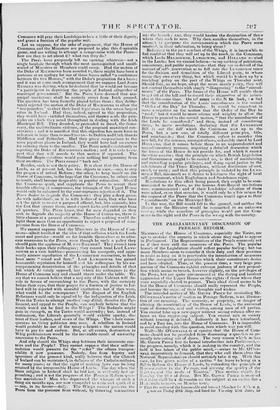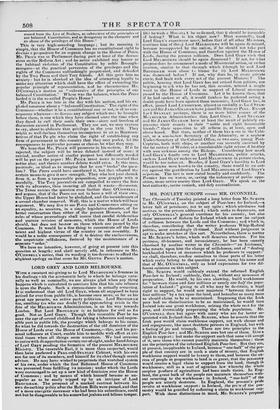THE PARLIAMENTARY DISCUSSION OF PEERAGE REFORM.
MEMBERs of the House of Commons, especially the Tories, are apt to mistake the capacity in which ulone they ought to appear in Parliament. The Representatives of the People commonly act as it' they were still the nominees of the Peers. The popular branch of the Legislature should reflect popular feeling; but too many Members seem to consider it their duty and their province to resist as long as it is practicable the introduction of measures and the recognition of principles which their constituents desire and have adopted. Thus, at the present time, a very large pro- portion of the Commons exhibit extreme jealousy of any proposi- tion which seems to trench, however slightly, on the privileges of the Peers, but are quite unconcerned at the daring and insolent aggression of the Upper House on the rights of those whom they were especially elected to protect. Their chief dread seems to be lest the House of Commons should really represent the People, and become the organ of their thoughts and wishes. MEMBERs of the House of Commons, especially the Tories, are apt to mistake the capacity in which ulone they ought to appear in Parliament. The Representatives of the People commonly act as it' they were still the nominees of the Peers. The popular branch of the Legislature should reflect popular feeling; but too many Members seem to consider it their duty and their province to resist as long as it is practicable the introduction of measures and the recognition of principles which their constituents desire and have adopted. Thus, at the present time, a very large pro- portion of the Commons exhibit extreme jealousy of any proposi- tion which seems to trench, however slightly, on the privileges of the Peers, but are quite unconcerned at the daring and insolent aggression of the Upper House on the rights of those whom they were especially elected to protect. Their chief dread seems to be lest the House of Commons should really represent the People, and become the organ of their thoughts and wishes. The intended motion of Mr. Gaove PRICE for rescinding Mr. O'CONNELL'S notice of motion on Peerage Reform, is an illustra- tion of cur meaning. The necessity, or propriety, or danger of altering the constitution of the House of Lois, is the universal topic of discussion, mad and written, among men of all parties. You cannot take up a newspaper without seeing column after co- lumn on this engrossing subject. You cannot mix in society without hearing it debated. Indirectly it has been introduced, and by a Tory too, into the House of Commons. It is impossible to avoid meeting with this question, turn which way you will. Well--Mr. O'CONNELL is of opinion that the House of Com- mons should not be precluded from discussing a questi mn so ge- nerally interesting out of doors. The very reason which makes Mr. GROVE PRICE fear its formal introduction into Parliemest,— the progress, namely, which it is making in .the country, and the held it has taken of the public mind,—seems to Mr. (Moe/- NELL imperatively to demand, that they who call themselves the National Representatives should seriously take it up. With this view, he has given notice_ of a motion " for leave to bring in a Bill to Reform the Muse of Lords, by extending the principle of It-p:e,:e:nation in tic Pee rage, and altering the quality of the nnectere, and the mode of Election.- This motion stands for t)e SlIst of June. Bet Mr. GarivE Piticz is resolved 11.0 there shall be a discussion cm the subject at an corker date. 11.3 hi-ends to move, an NI:al:lay Lest, " That the notice of the honourable and learnel Member n y, given vim Friday 20th May, amid fixed for Tut sday 2:st June, Le
erased from the List of Notices, as subversive of the principles of our balanced Constitution, and as derogatory to the character and an abuse of the privileges of this House."
This is very high-sounding language ; but its meaning is simply, that the House of Commons has no constitutional right to discuss a proposition for an organic change in the House of Peers. Mr. PRICE was in Parliament during part at least of the discus- sions on the Reform Act ; and be never exhibited any horror ut the habitual violation of the Constitution by noble Borough- mongers—at the practical perversion of the privileges and the rights of the Commons unblushingly perpetrated, and defended by the Tory Peers and their Tory friends. All this gave hint no anxiety : but he is shocked at the idea of attempting legally to make any alteration which shall have the effect of extending the popular principle of representation, and he characterizes Mr. O'CoNNELL's motion as " subversive of the principles of our balanced Constitution." Where was the balance, when the Peers lorded it in the so-called People's House ?
Mr. PRICE is too late in the day with his motion, and his ex- ploded nonsense about a " balanced Constitution." The right of the Commons—whether it be a constitutional one or not, is of no con- sequence whatever—to discuss any subject which may be brought before them, is one which they have claimed since the time when they dared to call their souls their own—since real freedom of discussion existed in Parliament. They are not, we may venture to say, about to abdicate that privilege in the year 1836. They might as well declare themselves incompetent to sit as Represen- tatives of that Pe .plc who claim the right of establishing any form of government in this country that they may prefer, let the consequences to particular persons or classes be what they may. We hope that Mr. PRICE will persevere in his motion. If it be rejected, the subject will be twice debated instead of once: if carried, another notice of similar purport but differently welded will be put on the paper: Mr. PRICE must move to rescind that notice also; and thence another debate would arise. Is this man, positively. so blind as to imagine that he can " burke" the ques- tion? The Peers could have smothered it, but they adopted the certain means to give it new strength. They who last 3 ear shrunk from it, as from a treasonable proposition, now grapple with it manfully. The Tory journalists are compelled to enter the lists with its advocates, thus insuring all that it wants—discussion. The limes carries the question even further than O'CONNELL; and argues, that if the Peers are not to have a will of their own, the Upper House had better be abolished, and the incumbrance of a second chamber removed. Well, this is a matter which will bear argument. We may live to see Peers and Commoners sitting on an equality, as senators, in a single legislative chamber, of far better construction than either of the present Houses, and the rules of whose proceedings shall insure that careful deliberation and mature revision of measures, which the House of Lords should, but does not bestow on those which are passed by the Commons. It would be a fine thing to concentrate all the first talent and highest virtue of the country in one assembly. It would be a noble consequence of it to destroy the exclusiveness, the unpatriotic selfishness, fostered by the maintenance of a separate "order."
We have no intention, however, of going at present into this question at length; and shall merely add, in reference to Mr. O'CONNELL's notice, that its wording is too decorous to afford the slightest apology on that score for Mr. GROVE PRICE'S motion.



























 Previous page
Previous page